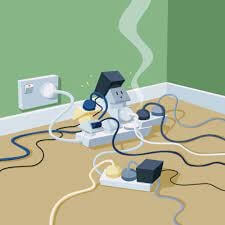It’s No “Shock” Everyone Should Know About Electrical Safety

As an Electrical Engineer with what seems to be a lifetime of experience in both the electrical and construction worlds, our clients have been thrilled that they hired someone with a deep understanding of all systems of the home…including the most hazardous one, the Electrical System. Simply put, it’s the knowledge that a typical inspector does not have.
Electrical systems, if installed and maintained properly can be perfectly safe. However, when they are not, or worse, when a homeowner attempts to do work themselves, it can cause great harm.
Below is an article on Electrical Safety that was originally published by InterNACHI, the world’s most accredited inspector certification program, with whom I received my Home Inspector Certification from.
Authored by InterNACHI https://www.nachi.org/electric.htm
Posted by Orgova Home Inspections https://www.orgovahomeinspections.com
Electricity is an essential part of our lives. However, it has the potential to cause great harm. Electrical systems will function almost indefinitely, if properly installed and not overloaded or physically abused. Electrical fires in our homes claim the lives of 485 Americans each year and injure 2,305 more. Some of these fires are caused by electrical system failures and appliance defects, but many more are caused by the misuse and poor maintenance of electrical appliances, incorrectly installed wiring, and overloaded circuits and extension cords.
Some safety tips to remember:
- Never use anything but the proper fuse to protect a circuit.
- Find and correct overloaded circuits.
- Never place extension cords under rugs.
- Outlets near water should be GFCI-type outlets.
- Don’t allow trees near power lines to be climbed.
- Keep ladders, kites, equipment, and anything else away from overhead power lines.
Electrical Panels
Electricity enters the home through a control panel and the main switch where one can shut off all the power in an emergency. These panels are usually located in the basement. Control panels use either fuses or circuit breakers. Install the correct fuses for the panel. Never use a higher-numbered fuse or a metallic item, such as a penny. If fuses are used and there is a stoppage in power, look for the broken metal strip in the top of a blown fuse. Replace the fuse with a new one marked with the correct amperage. Reset circuit breakers from “off” to “on.” Be sure to investigate why the fuse or circuit blew. Possible causes include frayed wires, overloaded outlets, or defective appliances. Never overload a circuit with high-wattage appliances. Check the wattage on appliance labels. If there is frayed insulation or a broken wire, a dangerous short circuit may result and cause a fire. If power stoppages continue or if a frayed or broken wire is found, contact an electrician.
Outlets and Extension Cords
Make sure all electrical receptacles or outlets are three-hole, grounded outlets. If there is water in the area, there should be a GFCI or ground-fault circuit interrupter outlet. All outdoor outlets should be GFCIs. There should be ample electrical capacity to run equipment without tripping circuit breakers or blowing fuses. Minimize extension cord use. Never place them under rugs. Use extension cords sparingly and check them periodically. Use the proper electrical cord for the job, and put safety plugs in unused outlets.
Electrical Appliances
Appliances need to be treated with respect and care. They need room to breathe. Avoid enclosing them in a cabinet without proper openings, and do not store papers around them. Level appliances so they do not tip. Washers and dryers should be checked often. Their movement can put undue stress on electrical connections. If any appliance or device gives off a tingling shock, turn it off, unplug it, and have a qualified person correct the problem. Shocks can be fatal. Never insert metal objects into appliances without unplugging them. Check appliances periodically to spot worn or cracked insulation, loose terminals, corroded wires, defective parts, and any other components that might not work correctly. Replace these appliances or have them repaired by a person qualified to do so.
Electrical Heating Equipment
Portable electrical heating equipment may be used in the home as a supplement to the home heating system. Caution must be taken when using these heating supplements. Keep them away from combustibles, and make sure they cannot be tipped over. Keep electrical heating equipment in good working condition. Do not use them in bathrooms because of the risk of contact with water and electrocution. Many people use electric blankets in their homes. They will work well if they are kept in good condition. Look for cracks and breaks in the wiring, plugs, and connectors. Look for charred spots on both sides. Many things can cause electric blankets to overheat. They include other bedding placed on top of them, pets sleeping on top of them, and putting things on top of the blanket when it is in use. Folding the blankets can also bend the coils and cause overheating.
Children
Electricity is important to the workings of the home but can be dangerous, especially to children. Electrical safety needs to be taught to children early on. Safety plugs should be inserted in unused outlets when toddlers are in the home. Make sure all outlets in the home have faceplates. Teach children not to put things into electrical outlets and not to chew on electrical cords. Keep electrical wiring boxes locked. Do not allow children to come in contact with power lines outside. Never allow them to climb trees near power lines, utility poles or high tension towers.

0 Comments